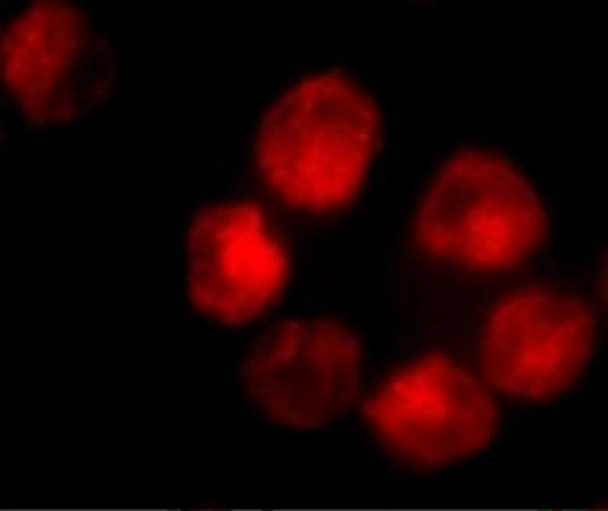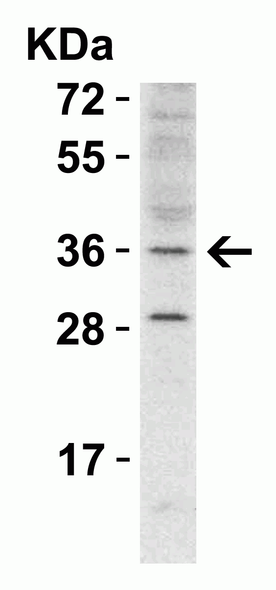Description
ADAM10 Antibody | 2051 | ProSci
Host: Rabbit
Reactivity: Human, Mouse, Rat
Homology: Predicted species reactivity based on immunogen sequence: Bovine: (100%) .
Immunogen: Anti-ADAM10 antibody (2051) was raised against a peptide corresponding to 17 amino acids near the carboxy terminus of human ADAM10.
The immunogen is located within the last 50 amino acids of ADAM10.
Research Area: Apoptosis, Cancer
Tested Application: E, WB, IF
Application: WB: 1 μg/mL; IHC: 2 μg/mL; IF: 10 μg/mL.
Antibody validated: Western Blot in human, mouse and rat samples; Immunofluorescence in human, mouse and rat samples. All other applications and species not yet tested.
Specificiy: N/A
Positive Control 1: Cat. No. 1224 - Daudi Cell Lysate
Positive Control 2: Cat. No. 17-004 - K-562 Cell Slide
Positive Control 3: N/A
Positive Control 4: N/A
Positive Control 5: N/A
Positive Control 6: N/A
Molecular Weight: Predicted: 84kD
Observed: 94 kD (precursor) and 68kD (mature form)
Validation:
KO validation (Figure 1 and 2) : Anti-ADAM10 antibody (2051) specificity was further verified by ADAM10 specific knockout. ADAM10 signal in was detected by 2051 in wild type of MEF cells and 293 cells, but not in ADAM10 knockout cells.
Independent Antibody Validation in Cell lines (Figure 3) shows similar ADAM10 expression profile in human and mouse cell lines detected by two independent anti-ADAM10 antibodies that recognize different epitopes, 2051 against C-terminus domain and 24-024 against human recombinant fusion protein. ADAM10 proteins are detected in the most tested cell lines at different expression levels by the two independent antibodies.
Regulated expression validation (Figure 12 and 14) : ADAM10 expression detected by anit-ADAM10 antibodies (2051) was down-regulated when exposed to oxygen-glucose deprivation (OGD) or glutamate (Fig 8) , and up-regulated in membrane compartment whereas down-regulated in intracellular fractions when treated with donepezil (Fig 14) .
KD validation (Figure 15) : Anti-ADAM10 antibody (2051) specificity was further verified by ADAM10 specific knockdown. ADAM10 signal in HEK/APP cells transfected with ADAM10 siRNA or Ferrochelatase siRNA (F) or N-methylprotoporphyrin IX siRNA (N) was disrupted in comparison with that in mock-transfected cells (M) or cells transfected with TACE siRNA (T) .
Isoform: Human ADAM10 has 2 isoforms, including isoform 1 (748aa, 84kD) and isoform 2 (447aa, 49kD) . Mouse ADAM10 has one isoform (749aa, 84kD) and Rat ADAM10 also has one isoform (749aa, 84kD) . ADAM10 of human, mouse and rat has precursor form (94kD) and mature form (68kD) . 2051 can detect both precursor ADAM10 and mature ADAM10 in human, mouse and rat.
Purification: ADAM10 Antibody is affinity chromatography purified via peptide column.
Clonality: Polyclonal
Clone: N/A
Isotype: IgG
Conjugate: Unconjugated
Physical State: Liquid
Buffer: ADAM10 Antibody is supplied in PBS containing 0.02% sodium azide.
Concentration: 1 mg/mL
Storage Condition: ADAM10 antibody can be stored at 4˚C for three months and -20˚C, stable for up to one year. As with all antibodies care should be taken to avoid repeated freeze thaw cycles. Antibodies should not be exposed to prolonged high temperatures.
Alternate Name: ADAM10 Antibody: RAK, kuz, AD10, AD18, MADM, CD156c, HsT18717, KUZ, Disintegrin and metalloproteinase domain-containing protein 10, CDw156, ADAM 10
User Note: Optimal dilutions for each application to be determined by the researcher.
BACKGROUND: ADAM10 Antibody: Proinflammatory cytokine tumor necrosis factor-alpha (TNF-α) contributes to a variety of inflammatory responses and programmed cell death. Notch receptor and its ligand participate in cell fate decisions during vertebrate development and are associated with several human disorders, including a T-cell lymphoma. TNF-α, notch and its ligand delta are all membrane-bond molecules, which are cleaved by proteases to release mature proteins or functional receptor. ADAM10, a metalloprotease-disintegrin in the family of mammalian ADAM (for a disintegrin and metalloprotease) , was recently identified to cleave TNF-α, notch and its ligand delta. The genes encoding human, mouse, and bovine ADAM10 were recently cloned and designated ADAM 10, kuzbanian (KUZ) , and MADM, respectively. ADAM10 mRNA is expressed in a variety of human and bovine tissues.
Additional Information
Clonality: |
Polyclonal |
Tested Applications: |
E, IF, WB |
Host Species: |
Rabbit |
Species Reactivity: |
Human, Mouse, Rat |
Conjugate: |
Unconjugated |



















































